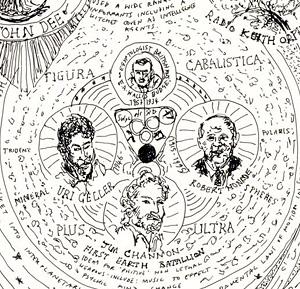HEXEN 2039 charts Brodsky's para scientific research towards the development of new mind control technologies for the British Military through a series of drawings and diagrams, a video, website and site-specific interventions. This complex body of work uncovers links between conspiracy theories, occult groups, Chernobyl, witchcraft, the US film industry, British Intelligence agencies, Soviet brainwashing, behaviour control experiments of the US Army and recent practices of its Civil Affairs and Psychological Operations Command (PSYOP) and new research in contemporary neuroscience.
"HEXEN 2039 offers us an inverted, riotous version of a sociopolitical history that stands in kaleidoscopic opposition to the homogenised, narrow flatland of the capitalist march forward. Treister's constructions belie a deeper mission: to explore how we make sense of history and the politics of war." (Jane D. Marsching)
In 1995 artist Suzanne Treister created the fictional alter ego Rosalind Brodsky, a delusional time traveller who believes herself to be working at the Institute of Militronics and Advanced Time Interventionality (IMATI) in the twenty-first century. Through Brodsky, Treister explores issues of history, global politics, religion, popular culture, sexuality, science, technology, the military and theories of the future.
The Rosalind Brodsky project has been described by Art in America as "One of the most sustained fantasy trips of contemporary art".
HEXEN 2039 was produced and curated by Tania Nasielski in London in 2006, with the support of Arts Council England.
The Prague installation, which will consist of diagrams drawn on the wall, video projections and additional material, is made possible through collaboration between Školská 28 gallery and the Mlok Association. An accompanying seminar program on 26 September will offer a reconstruction of a seminar in psychotropics from the year 1978. Part of the program will be a video projection of the documentary film "Experiment", about the Czech Army's experimentation with administering psychotropic drugs to soldiers during the 1970s.
Suzanne Treister studied in London at St Martin's and Chelsea Schools of Art and currently lives and works in London and Berlin. Treister has shown internationally since 1981. Recent exhibitions include: 'Operation Swanlake' at Annely Juda Fine Art, London; Künstlerhaus Bethanien, Berlin; Gallery Skuc, Ljubljana; Magazin4, Vorarlberger Kunstverein, Bregenz; '(The World May Be) Fantastic', 2002 Biennale of Sydney; 'Don't Call it Performance', Centro de Arte Reina Sofía Madrid and El Museo del Barrio, New York, USA.
